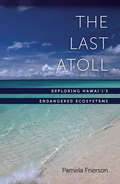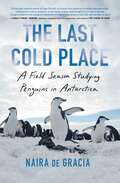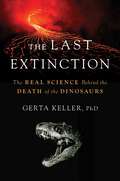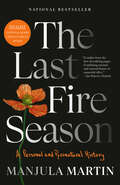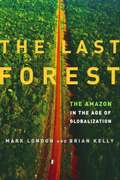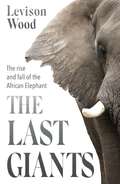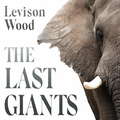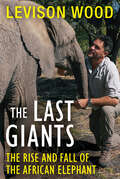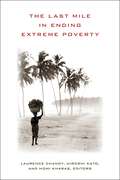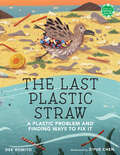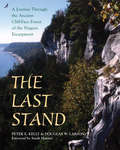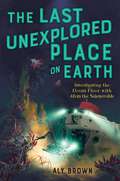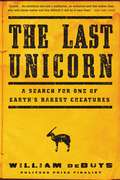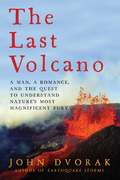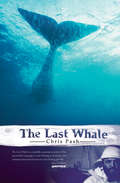- Table View
- List View
The Last Atoll
by Pamela FriersonThe Last Atoll is a first-person account of journalist Pamela Frierson's ten-year exploration of the exotic and ecologically significant small lands at the far northwestern end of the Hawaiian island chain. Frierson takes readers on a rare journey to eight of these remote and ancient islands, including the Kure Atoll, the oldest Hawa'i'ian island and the northernmost atoll in the world. In her 1,200-mile travels, Frierson discovers isolated landscapes, undisturbed ecosystems, and a nearly forgotten but well-preserved human history. It is a rich history of discovery by explorers and pirates, plus extensive military use. Frierson finds a vast wilderness, including the remnants of ancient volcanoes, and unique species of wildlife. She also explores the islands' location in the Great Pacific Garbage Patch, a major current that washes up the world's garbage. A lifelong resident of Hawai'i, Frierson draws broad conclusions relating to islands and their "canary in a coal mine" role.
The Last Atoll
by Pamela FriersonThe Last Atoll is a first-person account of journalist Pamela Frierson's ten-year exploration of the exotic and ecologically significant small lands at the far northwestern end of the Hawaiian island chain. Frierson takes readers on a rare journey to eight of these remote and ancient islands, including the Kure Atoll, the oldest Hawa'i'ian island and the northernmost atoll in the world. In her 1,200-mile travels, Frierson discovers isolated landscapes, undisturbed ecosystems, and a nearly forgotten but well-preserved human history. It is a rich history of discovery by explorers and pirates, plus extensive military use. Frierson finds a vast wilderness, including the remnants of ancient volcanoes, and unique species of wildlife. She also explores the islands' location in the Great Pacific Garbage Patch, a major current that washes up the world's garbage. A lifelong resident of Hawai'i, Frierson draws broad conclusions relating to islands and their "canary in a coal mine" role.
The Last Beach
by Orrin H. Pilkey Jr. J. Andrew CooperThe Last Beach is an urgent call to save the world's beaches while there is still time. The geologists Orrin H. Pilkey and J. Andrew G. Cooper sound the alarm in this frank assessment of our current relationship with beaches and their grim future if we do not change the way we understand and treat our irreplaceable shores. Combining case studies and anecdotes from around the world, they argue that many of the world's developed beaches, including some in Florida and in Spain, are virtually doomed and that we must act immediately to save imperiled beaches.After explaining beaches as dynamic ecosystems, Pilkey and Cooper assess the harm done by dense oceanfront development accompanied by the construction of massive seawalls to protect new buildings from a shoreline that encroaches as sea levels rise. They discuss the toll taken by sand mining, trash that washes up on beaches, and pollution, which has contaminated not only the water but also, surprisingly, the sand. Acknowledging the challenge of reconciling our actions with our love of beaches, the geologists offer suggestions for reversing course, insisting that given the space, beaches can take care of themselves and provide us with multiple benefits.
The Last Butterflies: A Scientist's Quest to Save a Rare and Vanishing Creature
by Nick HaddadA remarkable look at the rarest butterflies, how global changes threaten their existence, and how we can bring them back from near-extinctionMost of us have heard of such popular butterflies as the Monarch or Painted Lady. But what about the Fender’s Blue? Or the St. Francis’ Satyr? Because of their extreme rarity, these butterflies are not well-known, yet they are remarkable species with important lessons to teach us. The Last Butterflies spotlights the rarest of these creatures—some numbering no more than what can be held in one hand. Drawing from his own first-hand experiences, Nick Haddad explores the challenges of tracking these vanishing butterflies, why they are disappearing, and why they are worth saving. He also provides startling insights into the effects of human activity and environmental change on the planet’s biodiversity.Weaving a vivid and personal narrative with ideas from ecology and conservation, Haddad illustrates the race against time to reverse the decline of six butterfly species. Many scientists mistakenly assume we fully understand butterflies’ natural histories. Yet, as with the Large Blue in England, we too often know too little and the conservation consequences are dire. Haddad argues that a hands-off approach is not effective and that in many instances, like for the Fender’s Blue and Bay Checkerspot, active and aggressive management is necessary. With deliberate conservation, rare butterflies can coexist with people, inhabit urban fringes, and, in the case of the St. Francis’ Satyr, even reside on bomb ranges and military land. Haddad shows that through the efforts to protect and restore butterflies, we might learn how to successfully confront conservation issues for all animals and plants.A moving account of extinction, recovery, and hope, The Last Butterflies demonstrates the great value of these beautiful insects to science, conservation, and people.
The Last Cold Place: A Field Season Studying Penguins in Antarctica
by Naira de GraciaLab Girl meets Why Fish Don&’t Exist in this brilliant, fascinating memoir about a young scientist&’s experience studying penguins in Antarctica—a firsthand account of the beauty and brutality of this remote climate, the direct effects of climate change on animals, and the challenges of fieldwork.Naira de Gracia&’s The Last Cold Place offers a dramatic, captivating window into a once-in-a-lifetime experience: a season living and working in a remote outpost in Antarctica alongside seals, penguins, and a small crew of fellow field workers. In one of the most inhospitable environments in the world (for humans, anyway), Naira follows a generation of chinstrap penguins from their parents&’ return to shore to build nests from pebbles until the chicks themselves are old enough to head out to sea. In lively and entertaining anecdotes, Naira describes the life cycle of a funny, engaging colony of chinstrap penguins whose food source (krill, or small crustaceans) is powerfully affected by the changing ocean. Weaving together the history of Antarctic exploration with climate science, field observations, and her own personal journey of growth and reflection, The Last Cold Place illuminates the complex place that Antarctica holds in our cultural imagination—and offers a rare glimpse into life on this uninhabited continent.
The Last Extinction: The Real Science Behind the Death of the Dinosaurs
by Dr. Gerta KellerThe story behind Dr. Gerta Keller&’s world-shattering scientific discovery that dinosaur extinction was NOT caused by asteroid impact, but rather by volcanic eruptions on the Indian peninsula, a discovery that highlights today&’s existential threat of greenhouse gasses and climate change—and one that sparked an all-out war waged by the scientific establishment. Part scientific detective story, part personal odyssey, The Last Extinction is the definitive account of a radical theory that has reshaped how we understand our planet&’s past and, as we face the possibility of a sixth extinction, how we might survive its future. For decades, the dominant theory held that an asteroid impact caused the dinosaurs&’ extinction. But Princeton Geologist Dr. Gerta Keller followed the evidence to the truth: Deccan volcanism, a series of massive volcanic eruptions in India, triggered a long-term climate catastrophe and Earth&’s fifth mass extinction. Her findings upended the field and ignited a bitter feud in modern science—what became known as the &“Dinosaur Wars.&” Raised in poverty on a Swiss farm and told she could never be a scientist, Keller defied expectations, earning her PhD at Stanford and battling her way into the highest ranks of Geology, eventually becoming a Professor of Paleontology and Geology at Princeton University. Her refusal to back down in the face of ridicule, sabotage, and sexism makes her story as thrilling as her science, which offers urgent insight into today&’s climate crisis: Sustained planetary upheaval—not a single cataclysmic event—can plunge the planet into an age of death.
The Last Fire Season: A Personal and Pyronatural History
by Manjula MartinH Is for Hawk meets Joan Didion in the Pyrocene in this arresting combination of memoir, natural history, and literary inquiry that chronicles one woman&’s experience of life in Northern California during the worst fire season on record.A MOST-ANTICIPATED BOOK: The New York Times, The Los Angeles Times, The San Francisco Chronicle, The Saturday Evening Post, Poets & Writers, The Millions, Alta, Heat Map NewsTold in luminous, perceptive prose, The Last Fire Season is a deeply incisive inquiry into what it really means—now—to live in relationship to the elements of the natural world. When Manjula Martin moved from the city to the woods of Northern California, she wanted to be closer to the wilderness that she had loved as a child. She was also seeking refuge from a health crisis that left her with chronic pain, and found a sense of healing through tending her garden beneath the redwoods of Sonoma County. But the landscape that Martin treasured was an ecosystem already in crisis. Wildfires fueled by climate change were growing bigger and more frequent: each autumn, her garden filled with smoke and ash, and the local firehouse siren wailed deep into the night.In 2020, when a dry lightning storm ignited hundreds of simultaneous wildfires across the West and kicked off the worst fire season on record, Martin, along with thousands of other Californians, evacuated her home in the midst of a pandemic. Both a love letter to the forests of the West and an interrogation of the colonialist practices that led to their current dilemma, The Last Fire Season, follows her from the oaky hills of Sonoma County to the redwood forests of coastal Santa Cruz, to the pines and peaks of the Sierra Nevada, as she seeks shelter, bears witness to the devastation, and tries to better understand fire&’s role in the ecology of the West. As Martin seeks a way to navigate the daily experience of living in a damaged body on a damaged planet, she comes to question her own assumptions about nature and the complicated connections between people and the land on which we live.
The Last Flight of the Scarlet Macaw: One Woman's Fight to Save the World's Most Beautiful Bird
by Bruce BarcottCaring for orphaned animals at her own zoo in the tropical country of Belize, Sharon Matola became one of Central America's greatest wildlife defenders. And when powerful outside forces conspired with the local government to build a dam that would flood the nesting ground of the only scarlet macaws in Belize, Matola was drawn into the fight of her life. In The Last Flight of the Scarlet Macaw, award-winning author Bruce Barcott chronicles Sharon Matola's inspiring crusade to stop a multinational corporation in its tracks. Ferocious in her passion, Matila and her confederates--a ragtag army of courageous locals and eccentric expatriates--endure slander and reprisals and take the fight to the courtroom and the boardroom, from local village streets to protests around the globe. Barcott explores the tension between environmental conservation and human development, puts a human face on the battle over globalization, and ultimately shows us how one unwavering woman risked her life to save the most beautiful bird in the world.
The Last Forest: The Amazon in the Age of Globalization
by Mark London Brian KellyWith a landmass larger than the continental U. S. west of the Mississippi and the richest diversity of plant and animal species on earth, the Amazon has always struck its explorers and would-be exploiters as infinite and largely impenetrable. For decades, anthropologists assumed that permanent human habitation was impossible–-but they were wrong. Recently, proof of centuries-old Amazonian civilizations has been unearthed, shifting perceptions of the inhospitability of the rain forest and providing a precedent for human occupation. Today, as developers and environmentalists clash over the region’s future, the seemingly endless forest is fast disappearing in fires, rampant mineral extraction, rogue logging operations, and encroaching urban sprawl. Through a series of startling human encounters–interviews with government ministers and environmental crusaders, millionaire ranchers and disenfranchised slum dwellers–Mark London and Brian Kelly, longtime explorers and trailblazing chroniclers of the Amazon basin, trace the region’s transformation. Logging thousands of miles, London and Kelly take readers from the mushrooming shopping malls of Manaus to the pristine rain forest that still seems beyond the reach of civilization, from the ghostly ruins of abandoned factories and failed plantations to the thriving agribusinesses that one day may feed the entire world and change this landscape forever. Again and again, they collide with the same fundamental question: Is it too late to strike a balance in the Amazon between economic sustenance for the twenty-one million Brazilians who live there and protection for the world’s last great forest? London and Brian Kelly have fashioned a complex, vibrant portrait of a region on the edge of crisis. At once a seductive journey and a searing account of political, environmental, and social tumult, The Last Forest is a masterpiece of contemporary reporting.
The Last Giants: The Rise and Fall of the African Elephant
by Levison Wood*Levison Wood's documentary series on WALKING WITH ELEPHANTS is available to watch now on Channel 4*This book comes at a critical time. Fifty years ago, Africa was home to just over 1.3 million elephants, but by 1990 the number had halved. Meanwhile in the span of a lifetime, the human population has more than doubled. In Levison Wood's The Last Giants, he explores the rapid decline of one of the world's favourite animals. Filled with stories from his own time spent travelling with elephants in Africa, and documenting their migration in his Channel 4 series, Walking With Elephants, the book is a passionate wake-up call for this endangered species we take for granted. The Last Giants was written to inspire us all to act - to learn more and help save the species from permanent extinction.
The Last Giants: The Rise and Fall of the African Elephant
by Levison WoodThis book comes at a critical time. Thirty years ago, Africa was home to a million elephants, today the figure stands at less than half that. Meanwhile in the span of a lifetime, the human population has more than doubled. In Levison Wood's The Last Giants, he explores the rapid decline of one of the world's favourite animals. Filled with stories from his own time spent travelling with elephants in Africa, the book is a passionate wake-up call for this endangered species we take for granted. The Last Giants was written to inspire us all to act - to learn more and help save the species from permanent extinction.(P) 2020 Hodder & Stoughton Ltd
The Last Giants: The Rise and Fall of the African Elephant
by Levison WoodFrom the award-winning explorer, “an entertaining summary of what we know about the elephant, and a call to change our behavior to ensure its survival” (Daily Mail).The Last Giants satisfies British explorer Levison Wood’s lifelong desire to learn more about the majestic African elephant. These giants trek through some of Africa’s most magnificent landscapes as they go in search of life-giving waters and pastures. El Nino’s droughts and an insatiable ivory trade have cut African elephant numbers by a third in the last decade alone, and if elephants disappear entirely, Africa’s entire ecosystem could collapse. But Botswana has become a safe haven, where one-sixth of the world’s elephants now reside. Each year their numbers grow and an incredible migration takes place, which Wood witnesses and records. He teams up with local trackers to gain insight into how this iconic species survives, camps out in the wild, meets the people and tribes living on the migration’s path, and joins the park rangers whose job it is to protect these land goliaths, equipped with his “good eye for detail and better ear for dialogue” (The Wall Street Journal).“Adventurer Wood followed elephants on a 650-mile migration across Botswana for a British television program. This fascinating companion volume to that series examines the past, present, and future of the African elephant.” —Library Journal (starred review)“A smart, inviting portrait of elephants from a keen-eyed observer.” —Kirkus Reviews“A rewarding look at the habits and habitats of the African elephant . . . Comprehensively yet accessibly conveying Wood’s lifelong fascination with African elephants, his discussion will appeal to anyone keen on learning more about them.” —Publishers Weekly
The Last Landscape
by William H. WhyteThis book is about the way our metropolitan areas look and the way they might look. Its thesis is that they are going to look much better, that they are going to be much better places to live in, and that one of the reasons they are is that a lot more people are going to be living in them. Many thoughtful observers believe the opposite is true. They hold that not only is the landscape of our cities and suburbs a hideous mess, as indeed much of it is, but that it is bound to become much worse. The saturation point has been reached, they say, and unless growth and population trends are redirected, our metropolitan areas will become fouler yet. Some think they are beyond redemption already and that the only real hope is to start afresh, somewhere else, with new towns and cities.
The Last London: True Fictions from an Unreal City
by Iain SinclairA New Statesman Book of the Year London. A city apart. Inimitable. Or so it once seemed. Spiralling from the outer limits of the Overground to the pinnacle of the Shard, Iain Sinclair encounters a metropolis stretched beyond recognition. The vestiges of secret tunnels, the ghosts of saints and lost poets lie buried by developments, the cycling revolution and Brexit. An electrifying final odyssey, The Last London is an unforgettable vision of the Big Smoke before it disappears into the air of memory.
The Last Mile in Ending Extreme Poverty
by Homi Kharas Laurence Chandy Hiroshi KatoThe past quarter century has witnessed a stunning reduction in the number of people around the world living on less than $1.25 a day, the marker for extreme poverty. This has led to a new sense of hope that extreme poverty can be eradicated within a generation. Yet optimism is tempered by the unique circumstances facing those who remain left behind and new challenges that weaken traditional paths to prosperity. The Last Mile in Ending Extreme Poverty explores what it will take to finish the course. It identifies three critical challenges that define the last mile: securing peace, creating jobs, and strengthening resilience. These are issues that development experts have largely overlooked, on which cutting-edge knowledge is blunt and best-practice solutions feel decidedly underwhelming.By uncovering evidence and approaches to address these issues--and while pointing out the knowledge gaps that remain--The Last Mile outlines an agenda to inform development research and poverty reduction strategies for governments, international organizations, donors, charities, and foundations around the world.Contributors: Michael Carnahan (Department of Foreign Affairs and Trade, Government of Australia), Raj M. Desai (Georgetown University and Brookings), Shane Evans (Department of Foreign Affairs and Trade, Government of Australia), Akio Hosono (JICA), Bruce Jones (Brookings), Marcus Manuel (Overseas Development Institute), John McArthur (Brookings and UN Foundation), Alastair McKechnie (Overseas Development Institute and University of Otago), Gary Milante (Stockholm International Peace Research Institute), Yoichi Mine (JICA and Doshisha University), Ryutaro Murotani (JICA), John Page (Brookings), Go Shimada (University of Shizuoka, JICA, Columbia University, and Waseda University), Stephen C. Smith (George Washington University and Brookings)er disasters, Go Shimada, JICA-RI Social protection and the end of extreme poverty, Raj Desai, Georgetown University and Brookings
The Last Mixtape: Physical Media and Nostalgic Cycles
by Seth LongA reflection on the evolution of physical media into metaphor, through the history of music curation. Obsolescence makes the heart grow fonder, at least in the case of the mixtape. Not all technologies are so lucky. Some (say, wax cylinders) fade almost completely from cultural memory. A lucky few pass into metaphor: we still “hang up” our smartphones, “cut” film, and “patch” computer code. As digital streaming completes the obsolescence of physical media, what will become of the humble cassette? In The Last Mixtape, Seth Long offers a microhistory of music curation, anchored by the cassette, from which he explores the meanings of obsolescence, ownership, nostalgia, and the speed of cultural change. A moving meditation on our relationship with music, memory, and curation in the digital century, Long ultimately calls for a return to the media ecology represented by the mixtape: a world in which media is cheap and abundant but tactile and meaningfully engaged.
The Last Panda
by George B. SchallerDependent on a shrinking supply of bamboo, hunted mercilessly for its pelt, and hostage to profiteering schemes once in captivity, the panda is on the brink of extinction. Here, acclaimed naturalist George Schaller uses his great evocative powers, and the insight gained by four and a half years in the forests of the Wolong and Tangjiahe panda reserves, to document the plight of these mysterious creatures and to awaken the human compassion urgently needed to save them. "No scientist is better at letting the rest of us in on just how the natural world works; no poet sees the world with greater clarity or writes about it with more grace. . . . Anyone who genuinely cares for wildlife cannot help being grateful to Schaller-both for his efforts to understand the panda and for the candor with which he reports what has gone so badly wrong in the struggle to save it from extinction. "-Geoffrey C. Ward, New York Times Book Review "Schaller's book is a unique mix of natural history and the politics of conservation, and it makes for compelling reading. . . . Having been in giant panda country myself, I found some of the descriptions of the animals and habitats breathtaking. Schaller describes the daily routines and personalities of the giant pandas he studied (as well as their fates thereafter) as though they were his blood relatives. . . . Schaller's brilliant presentation of the complexities of conservation makes his book a milestone for the conservation movement. "-Devra G. Kleiman, Washington Post Book World "George Schaller's most soulful work, written in journal style with many asides about a creature who evolved only two to three million years ago (about the same time as humans). . . . Here, conservation biology confronts an evil that grinds against hope and shatters the planet's diversity. Written with hope. "-Whole Earth Catalog "A nicely crafted blend of wildlife observation and political-cultural analysis. . . . The Last Panda is a sad chronicle of our failure, so far, to stem the decline of the animal that may be the most beloved on the planet. "-Donald Dale Jackson, Smithsonian
The Last Plastic Straw: A Plastic Problem and Finding Ways to Fix It (Books for a Better Earth)
by Dee RomitoLearn how and why a useful, 5000-year-old invention has become a threat to our planet—and what you can do about it—in this history of the simple straw. <P><P> From reeds used by ancient Sumerians to bendy straws in World War II hospitals, people have changed the straw to fit their needs for 5000 years. Today however, this useful tool is contributing to the plastic problem polluting our oceans. Once again, the simple straw needs a reinvention. <P><P> With bright illustrations and well-researched text, children can read about the inventors behind the straw’s technological advancements, including primary sources like patents, as well as how disposable plastic harms the environment. See the newest solutions, from plastic straw alternatives to activism by real kids like Milo Cress who started the Be Straw Free campaign when he was 11 years old. <P><P> Learn about what kids can do to reduce plastic waste. The backmatter includes more information on the movement to stop plastic waste, action items kids can do, a bibliography, and additional resources on plastic pollution. <P><P><i>Advisory: Bookshare has learned that this book offers only partial accessibility. We have kept it in the collection because it is useful for some of our members. Benetech is actively working on projects to improve accessibility issues such as these.</i>
The Last Stand: A Journey Through the Ancient Cliff-Face Forest of the Niagara Escarpment
by Doug Larson Peter E. Kelly Sarah HarmerThe most ancient and least disturbed forest ecosystem in eastern North America clings to the vertical cliffs of the Niagara Escarpment. Prior to 1988 it had escaped detection even though the entire forest was in plain view and was being visited by thousands upon thousands of people every year. The reason no one had discovered the forest was that the trees were relatively small and lived on the vertical cliffs of the Niagara Escarpment. The Last Stand reveals the complete account of the discovery of this ancient forest, of the miraculous properties of the trees forming this forest (eastern white cedar), and of what is was like for researchers to live, work and study within this forest. The unique story is told with text, with stunning colour photographs and through vivid first-hand accounts. This book will stand the test of time as a testament to science, imagination and discovery.
The Last Unexplored Place on Earth: Investigating the Ocean Floor with Alvin the Submersible
by Aly BrownDive into the world of Alvin the Submersible, as award winning journalist Aly Brown shares the stories of what lies beneath the waves, including lost hydrogen bombs, underwater volcanoes, storied shipwrecks, and hundreds of new species.Humans have explored the far reaches of the globe, from the top of Mount Everest to Badwater Basin—a stretch of land 282 feet below sea level. But for most of our time on this planet, the ocean has been a huge mystery. It's only in the last 50 years that scientists have really started studying the ocean floor, with the help of one amazing creation: Alvin the submersible. A deep-sea vessel that can sink miles below the surface with three people inside, Alvin and its crew have uncovered a treasure trove of information in the last fifty years. From tracking down lost hydrogen bombs to exploring underwater volcanoes to capturing footage of storied shipwrecks, there's so much waiting to be discovered beneath the waves! Join award winning journalist Aly Brown as she dives into the wonders of Alvin’s world and see for yourself what lies in the last unexplored place on earth!
The Last Unicorn: A Search for One of Earth's Rarest Creatures
by William DebuysAn award-winning author's stirring quest to find and understand an elusive and exceptionally rare species in the heart of Southeast Asia's jungles.In 1992, in a remote mountain range, a team of scientists discovered the remains of an unusual animal with beautiful long horns. It turned out to be a living species new to western science -- a saola, the first large land mammal discovered in 50 years.Rare then and rarer now, no westerner had glimpsed a live saola in the wild before Pulitzer Prize finalist and nature writer William deBuys and conservation biologist William Robichaud set off to search for it in the wilds of central Laos. The team endured a punishing trek, up and down whitewater rivers and through mountainous terrain ribboned with the snare lines of armed poachers.In the tradition of Bruce Chatwin, Colin Thubron, and Peter Matthiessen, THE LAST UNICORN is deBuys's look deep into one of the world's most remote places. As in the pursuit of the unicorn, the journey ultimately becomes a quest for the essence of wildness in nature, and an encounter with beauty.
The Last Volcano: A Man, a Romance, and the Quest to Understand Nature's Most Magnificent Fury
by John DvorakRanging from Yellowstone in Wyoming to Mount Pelee in the Caribbean, from Bogoslof and Pavlov in Alaska, to Sakurajima in Japan, and, finally, to the massive volcanoes of Kilauea and Mauna Loa in Hawaii—The Last Volcano reveals the incredible journey of a man on a mission to understand the awesome power of volcanic eruptions. Volcanoes have fascinated—and terrified—people for ages. They have destroyed cities and ended civilizations. John Dvorak, the acclaimed author of Earthquake Storms, looks into the early scientific study of volcanoes and the life of the man who pioneered the field, Thomas Jaggar. Educated at Harvard, Jaggar went to the Caribbean after Mount Pelee exploded in 1902, killing more than 26,000 people. Witnessing the destruction and learning about the horrible deaths these people had suffered, Jaggar vowed to dedicate himself to a study of volcanoes. What followed was fifty years of global travel to eruptions in Italy, Alaska, Central America, Japan and the Pacific. In 1912, he built a small science station at the edge of a lake of molten lava at Kilauea volcano in the Hawaiian Islands, with the goal of solving the mystery of why volcanoes erupt and how they could be predicted. Jaggar found something else at Kilauea: true love. She was Isabel Maydwell, a widowed school teacher who came to Kilauea to restart her life. For more than twenty ears, she and Jaggar ran the science station, living in a small house at the edge of a high cliff that overlooked the lava lake. Maydwell would quickly becoming one of the world’s most astute observers of volcanic activity. Mixed with tales of myths and rituals, as well as the author’s own experiences and insight into volcanic activity, The Last Volcano reveals the lure and romance of confronting nature in its most magnificent form—the edge of a volcanic eruption.
The Last Whale
by Chris PashAt the end of the 1970s, one young reporter bears witness to the final days of Australia’s whaling industry. Thirty years after the last whale was captured and slaughtered in Australia, this incisive account tells the very human story of the characters and events that brought whaling to an end. This fair and balanced account portrays the raw adventure of going to sea, the perils of being a whaler, and the commitment that leads activists to throw themselves into the path of an explosive harpoon. Accompanied by a wonderful photographic record of the time, this is the action-packed history of a town reliant on whaling dollars pitted against a determined band of protesters.
The Last Whalers: Three Years in the Far Pacific with a Courageous Tribe and a Vanishing Way of Life
by Doug Bock Clark<P><P>On a volcanic island in the Savu Sea so remote that other Indonesians call it "The Land Left Behind" live the Lamalerans: a tribe of 1,500 hunter-gatherers who are the world's last subsistence whalers. They have survived for half a millennium by hunting whales with bamboo harpoons and handmade wooden boats powered by sails of woven palm fronds. <P><P>But now, under assault from the rapacious fores of the modern era and a global economy, their way of life teeters on the brink of collapse. <P><P>Award-winning journalist Doug Bock Clark, one of a handful of Westerners who speak the Lamaleran language, lived with the tribe across three years, and he brings their world and their people to vivid life in this gripping story of a vanishing culture. Jon, an orphaned apprentice whaler, toils to earn his harpoon and provide for his ailing grandparents, while Ika, his indomitable younger sister, is eager to forge a life unconstrained by tradition, and to realize a star-crossed love. Frans, an aging shaman, tries to unite the tribe in order to undo a deadly curse. And Ignatius, a legendary harpooner entering retirement, labors to hand down the Ways of the Ancestors to his son, Ben, who would secretly rather become a DJ in the distant tourist mecca of Bali. <P><P>Deeply empathetic and richly reported, The Last Whalers is a riveting, powerful chronicle of the collision between one of the planet's dwindling indigenous peoples and the irresistible enticements and upheavals of a rapidly transforming world.
The Last Winter: The Scientists and Adventurers Trying to Save the World
by Porter FoxAs the planet warms, winter is shrinking. In the last fifty years, the Northern Hemisphere lost a million square miles of spring snowpack, and high-elevation snowpacks in the western United States have decreased by nearly half since 1982. On average, winter has shrunk by a month in most northern latitudes.In this deeply researched, beautifully written, and adventure-filled book, journalist Porter Fox travels along the edge of the Northern Hemisphere's snow line to track the scope of this drastic change and how it will literally change everything-from rapid sea level rise, to fresh water scarcity for two billion people, to massive greenhouse gas emissions from thawing permafrost, and several climate tipping points that could very well spell the end of our world.This original research is animated by four harrowing and illuminating journeys-each grounded by interviews with idiosyncratic, charismatic experts in their respective fields and Fox's own narrative of growing up on a remote island in northern Maine.Timely, atmospheric, and expertly investigated, The Last Winter showcases a shocking and unexpected casualty of climate change-which may well set off its own unstoppable warming cycle.
